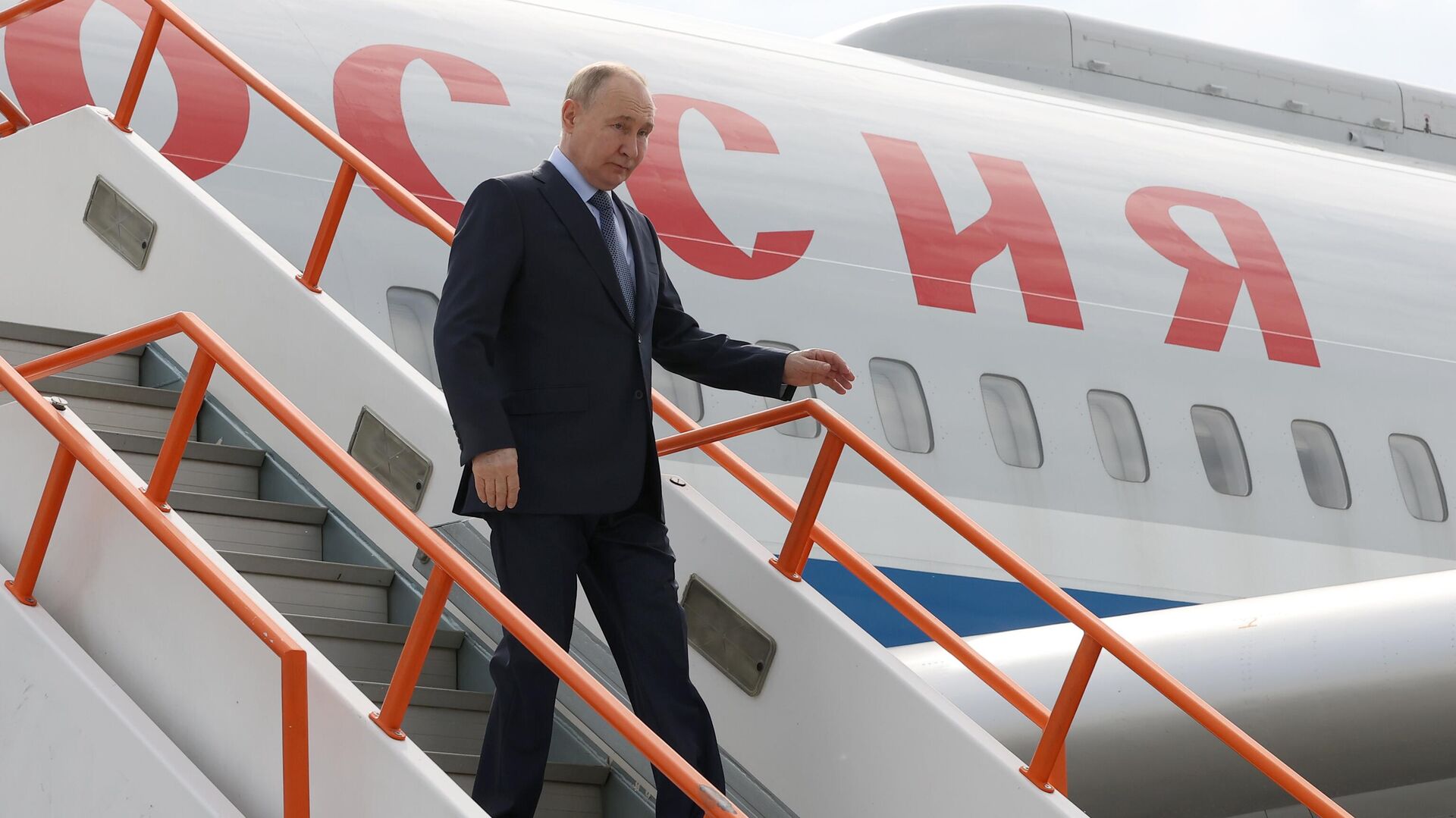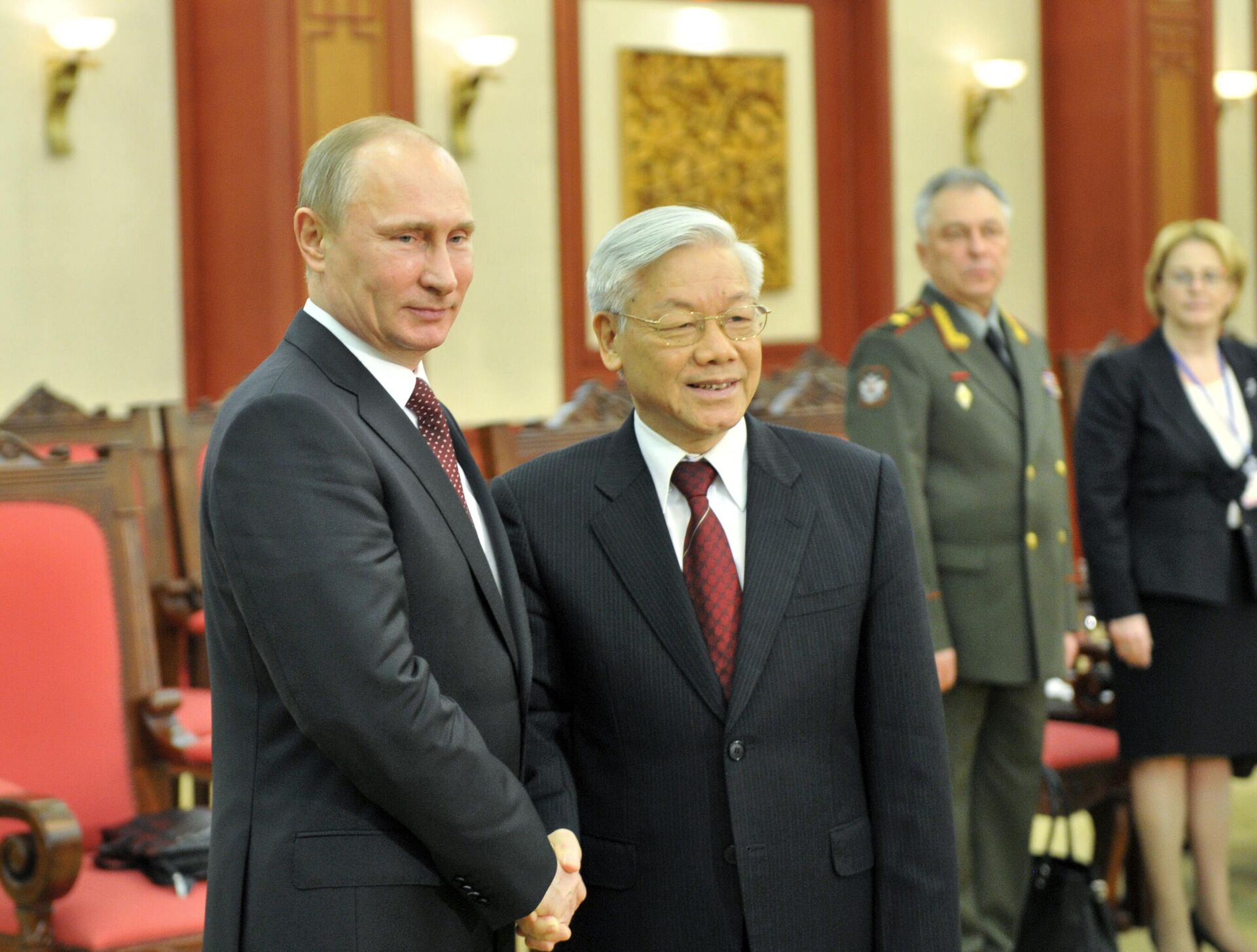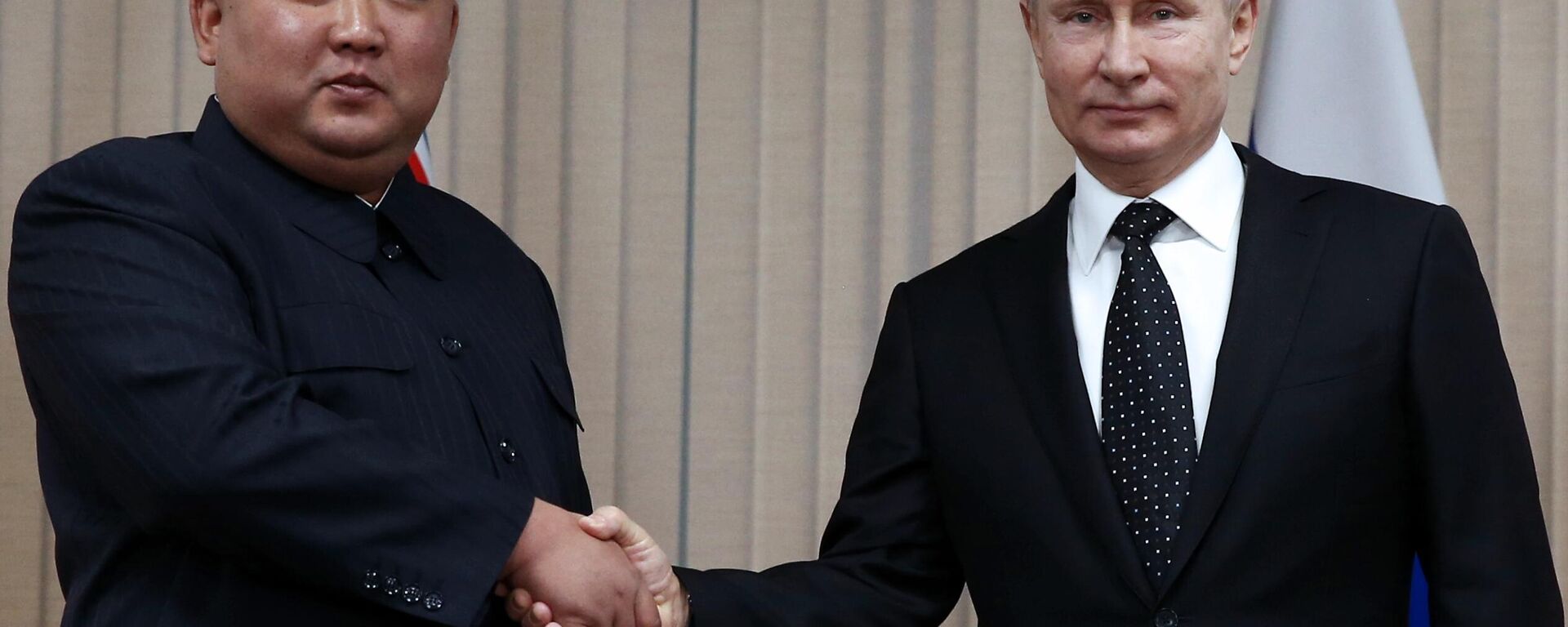What to Anticipate From Putin's Official Visits to North Korea and Vietnam
15:28 18.06.2024 (Updated: 16:01 18.06.2024)

© Sputnik . POOL
/ Subscribe
Longread
Kim Jong Un, the leader of North Korea, invited Russian President Vladimir Putin to Pyongyang in September 2023 as a reciprocal visit. Following that, the Russian leader will visit Vietnam on June 19–20 at Communist Party General Secretary Nguyen Phu Trong's invitation.
As part of Russia’s trend towards actively boosting mutually beneficial ties with its partners in Asia, President Vladimir Putin is set to visit two very promising and, from a strategic point of view, important partner states – North Korea and Vietnam.
North Korea
The visit of the Russian head of state to Pyongyang promises to be “very intensive," presidential aide Yury Ushakov told reporters on Monday.
He also shed light on the itinerary of the visit.
Putin will arrive in Pyongyang late in the evening on June 18. The Russian delegation will include newly appointed Defense Minister Andrei Belousov, Foreign Minister Sergey Lavrov, Deputy Prime Minister Alexander Novak, Russian First Deputy Prime Minister Denis Manturov, Roscosmos chief Yuri Borisov, Transport Minister Roman Starovoit, Health Minister Mikhail Murashko, Minister of Natural Resources and Environment Alexander Kozlov, General Director of Russian Railways Oleg Belozerov, Governor of Russia’s Primorsky Territory Oleg Kozhemyako.
The substantive part of the formal visit will take place on June 19. The program includes a parade at Kim Il Sung Square and a gala concert in honor of Putin's visit, which the president will attend. A wreath will be laid at the Liberation Monument in Pyongyang, erected as a sign of gratitude by the Korean people to the Soviet soldiers who fell during the liberation of Korea in 1945.
An exchange of speeches will take place at the state reception in Putin’s honor.
Negotiations in an expanded bilateral format and a tete-a-tete meeting between the North Korean leader and the visiting Russian president are planned for the day.
Vladimir Putin and Kim Jong Un will discuss issues pertaining to the economy, energy, transport, agriculture, education and culture, interregional relations, security issues, and cooperation in the international arena.
Trade is expected to be an important topic. In 2023, mutual trade turnover increased ninefold to reach $34.4 million, and both sides hope to consolidate this trend.
Putin has accepted a proposal from the Russian Foreign Ministry to sign a strategic partnership agreement with North Korea, according to a relevant decree published on the official legal information portal on Tuesday.
Putin and Kim Jong Un will talk to the media about the results of the negotiations.
The North Korean leader will accompany Putin to the airport after negotiations, with the leaders visiting the only Russian Orthodox church in North Korea, Jangbaeksan Church (Holy Trinity Cathedral), on the way.
In July 2000, Russian President Vladimir Putin made his first official visit to North Korea, with which the USSR was the first to establish diplomatic relations in 1948. Since then, a rapidly changing geopolitical climate has spurred relations between the two countries.
In September 2023, North Korean leader Kim Jong Un paid a visit to Russia and held talks with Russian President Vladimir Putin. Kim also met with then-Russian Defense Minister Sergei Shoigu. That visit to Russia brought about "a new radical turn" in the development of Moscow-Pyongyang relations and consolidated "the traditional ties of good neighbor and cooperation" between the two countries. The sides discussed everything, ranging from military-technological cooperation to Russian help for North Korea's satellite program.
Moscow has “highly appreciated the DPRK’s unwavering support for Russia’s special military operation in Ukraine… willingness to defend our common priorities and views within the UN," Putin wrote in the North Korean newspaper Rodong Sinmun ahead of his state visit.
Ahead of the visit, the Russian president accepted a proposal from Russia's Foreign Ministry to sign a strategic partnership agreement with North Korea.
"To accept the proposal of the Russian Ministry of Foreign Affairs, agreed with interested federal government bodies and organizations to sign a Comprehensive Strategic Partnership Agreement between Russia and North Korea. To allow the Russian Ministry of Foreign Affairs, during negotiations on the signing of the said treaty, to make changes to its draft that are not of a fundamental nature," the document reads.
The countries plan to develop humanitarian cooperation, transportation and communication infrastructure, education, healthcare, sports, culture, mutual tourist trips, and cultural exchanges. Another important issue is alternative trade and mutual settlement mechanisms that are “not controlled by the West.”
Using North Korean labor beyond Russia’s Far East is another issue that has reportedly been under discussion.
Russia and North Korea plan to outline prospects for strategic cooperation, taking into account the current international situation and the formation of a Washington-Tokyo-Seoul bloc. The three countries signed a trilateral security pact at Camp David in August and staged their first-ever joint exercises last fall. Russia, China, and North Korea have been expressing concerns about US attempts to militarize the Asia-Pacific.
Western officials have resorted to their usual belligerent rhetoric, voicing “concerns” on the eve of Putin’s visit to Pyongyang. This prompted Kremlin spokesman Dmitry Peskov to underscore Russia’s right to cooperate with the DPRK, also noting the huge potential for the development of bilateral relations.
The development of cooperation with the DPRK is, to a degree, hamstrung by sanctions that Russia also voted for. But in a recent development, Russia said it would not allow the restoration of a mechanism for imposing restrictions against North Korea in the UN Security Council. On March 28, Russia blocked a US draft resolution in the UN Security Council to extend the work of the UNSC's Committee 1718 on sanctions against North Korea for one year. Its mandate expired on April 30.
Vietnam
Vladimir Putin's visit to Vietnam will be his first since 2017. When Communist Party General Secretary Nguyen Phu Trong invited the Russian leader to visit the Southeast Asian country in March, he emphasized that Vietnam considers its relationship with Russia one of its foreign policy priorities.

Russian President Vladimir Putin (left) and Vietnamese Communist Party Chief Nguyen Phu Trong meeting at the Vietnamese Communist Party's central office in Hanoi, November 12, 2013.
© Sputnik . Aleksey Nikolskyi
/ On June 19, the Russian leader will arrive in Hanoi, where a ceremonial reception will be held to mark Putin's visit.
The Russian president will meet with General Secretary of the Vietnamese Communist Party's Central Committee Nguyen Phu Trong, President To Lam, Prime Minister Pham Minh Chinh, and Chairman of the National Assembly Tran Thanh Man.
The meeting with the Vietnamese prime minister will take place over a working breakfast, addressing economic topics.
Bilateral talks are set to touch upon initiatives to promote bilateral cooperation in areas such as security and defense, economy and trade, culture, and tourism.
Putin will also meet with graduates of Soviet and Russian universities and lay wreaths at the Monument to Fallen Heroes in Hanoi.
The visit is expected to result in the adoption of a joint statement confirming the principles of further partnership between the countries. A total of around 20 documents on joint cooperation are expected to be signed.
Vietnam and Russia established diplomatic relations in 1950 and elevated the relationship to a Comprehensive Strategic Partnership in 2012. In the 1970s and 1980s, the Soviet Union was Vietnam's main trading partner. Since then, major players such as China and the US have made significant diplomatic overtures towards the country, with the Biden administration courting the nation as part of a broader “pivot to Asia.”
Hanoi has not backed away from its traditional partnership with Moscow, with the two countries actively cooperating in energy, medicine, and agriculture. Vietnam has been the largest buyer of weapons from Russia for many decades. A free trade agreement between Vietnam and the Eurasian Economic Union (EAEU) was signed in 2016.
Trade turnover between Russia and Vietnam grew by more than 8% and reached $5 billion in 2023, showing potential for further growth. Russia could possibly increase exports to Vietnam of petroleum products such as coal, metals, rubber, and various types of polyethylene, as well as agricultural goods such as wheat, corn, and soybeans.
Vietnam offers export potential for products such as phones, computers, televisions, electronic integrated circuits, auto components, pneumatic tires, furniture, shoes, and clothing.
As of April, Russia had reportedly invested $984.98 million in 186 projects in Vietnam. Hanoi, in turn, has invested $1.63 billion in 18 projects in Russia, with an emphasis on sectors like oil and gas, manufacturing, and agriculture, according to Vietnam’s Ministry of Planning and Investment. The target goal for trade turnover between Russia and Vietnam is $10 billion by 2025.
In October 2023, within the framework of Russian Energy Week, ministers of the two countries discussed joint production of oil and gas resources, cooperation in the coal sector and electric power industry, and modernization and construction of new electric power facilities in Vietnam. Vietsovpetro is a successful joint venture for oil and gas exploration between Vietnam and Russia, running one of the Southeast Asian country’s largest oil fields. The parties agreed on support for existing and new projects with the participation of Gazprom, Novatek, Rosatom, and PetroVietnam.
The Vietnam-Russia Joint Bank (VRB), set up in 2006, has now established a payment system in national currencies for trade and economic cooperation between the two countries. Settlements between Russia and Vietnam in national currencies in 2023 increased fourfold.

